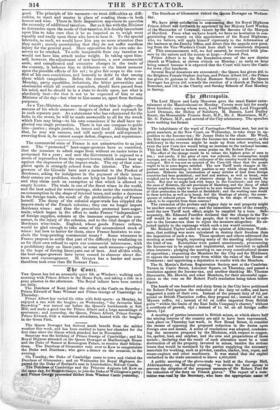The commercial state of France is not uninstructive to us
just now. The "protected" beet-sugar-growers have so contrived, that the measure to admit sugar from without on easier terms is postponed for a year ; and now the Government is exposed to a storm of reproaches from the seaport-towns, which cannot bear up against the depression of the import-trade. The cry of that corn-• plaint again is strangely echoed from the interior. The wine- growers of the Gironde have sent a memorial to the Prefect of Bordeaux, asking for indulgence in the payment of their taxes: their estates are profitless, stocks are lying on hand liable to loss ; and they claim such an exemption as that which is allowed to empty hz,-eses. The trade in one of the finest wines in the world, and the best suited for water-carriage, sinks under the restrictions on consumption in the shape of internal taxes, and under a decrease in the foreign trade, the result of the prohibitive policy of France herself. The decay of the colonial sugar-trade has crippled the import-trade of the French colonies; they can no longer import Bordeaux wines : and thus the precarious protected beet-sugar- trade, which began in the effort to make France "independent " of foreign supplies, subsists at the immense expense of the con- sumer, to the injury of the colonies, and to the vital danger of the Bordeaux wine-trade. England, whose goods France refuses, would be glad enough to take some of the accumulated stock of wines : but how to barter for them, since France hesitates to con- clude the long-pending commercial treaty f Some wiseacres in France propose to settle that part of the difficulty by retaliating on us for their own refusal to open our commercial intercourse, with a prohibitory duty on linen-yarn, or some such measure—perhaps in the hope of forcing linen-yarn out of beet. And all this while, the beet-sugar-growers have never ceased to clamour about dis- tress and encouragement. M. Gomm has a harder and more thankless task even than Sir ROBERT PEEL.


























 Previous page
Previous page